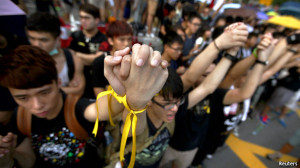Hopes and Concerns for the Protest in Hong Kong
 The protest in Hong Kong that has lasted for two months is losing its momentum. The Occupy Center movement, a sit-in movement that has occupied Hong Kong’s central business district Mong Kok for six weeks, is at the risk of dismissal. On November 14, the High Court issued an injunction that all streets should be cleared. After the execution of the injunction on November 17, any remaining protesters in the Mong Kok will face arrest and be brought to the court. The hope of the student leaders to meet with Beijing’s official crumbled as the Chinese government invalidated their travel document. It seems that the government’s do-nothing strategy of maintaining the unyielding position is working.
Why hasn’t the protest born any fruits? Some people point out that the movement lacks leaders. The movement started with college students protesting against Beijing’s denial of the civil nomination of Hong Kong’s electoral candidates. The spontaneous and grass-root movement rapidly earned the public sympathy and support, but failed to propose specific strategies and objectives. In the face of a prolonged stalemate, protesters split in their opinions and decreased in number, which highlighted the lack of a cohesive leadership.
The protest in Hong Kong that has lasted for two months is losing its momentum. The Occupy Center movement, a sit-in movement that has occupied Hong Kong’s central business district Mong Kok for six weeks, is at the risk of dismissal. On November 14, the High Court issued an injunction that all streets should be cleared. After the execution of the injunction on November 17, any remaining protesters in the Mong Kok will face arrest and be brought to the court. The hope of the student leaders to meet with Beijing’s official crumbled as the Chinese government invalidated their travel document. It seems that the government’s do-nothing strategy of maintaining the unyielding position is working.
Why hasn’t the protest born any fruits? Some people point out that the movement lacks leaders. The movement started with college students protesting against Beijing’s denial of the civil nomination of Hong Kong’s electoral candidates. The spontaneous and grass-root movement rapidly earned the public sympathy and support, but failed to propose specific strategies and objectives. In the face of a prolonged stalemate, protesters split in their opinions and decreased in number, which highlighted the lack of a cohesive leadership.
A more deep-rooted division in the society also impeded translation of the public’s frustration into an actual change. Hong Kong’s Chief Executive Leung Chun-ying has expressed concern that an open election would generate a pressure on the government for a welfare state and against business-friendly policies. The possibility of progressive populism is indeed a common concern of Hong Kong's business and professional elites. It is not surprising that business and financial giants responded with indifference or open disagreement to the protest. Li Ka-shing, a real estate magnate of Hong Kong, urged the public “not to let today’s passion become tomorrow’s regret” and “to return home immediately.” The silence of those who exert the greatest influence on Beijing’s decision worked in favor of the Hong Kong government.
Although Hong Kong’s economic prosperity makes the city indispensable to Beijing, Hong Kong also relies on Beijing for security, resource supply and investment. Therefore, some people consider Beijing’s favor as crucial to the city’s prosperity. Also, a generational divide separates young students who support the protests and older people who side with Beijing’s active and direct engagement with the region.The divided views on the future of Hong Kong is another factor that weakens the democracy movement.
On the other hand, lack of substantial achievement does not mean any more gain for the government. A recent poll showed that the public support for the Chief Executive has hit the lowest point. The public denunciation and an online petition against Laura Cha, who pointed to the long history of America’s civil rights movement and urged the protesters to “wait for a while,” elicited her apology.
More importantly, the protest has revealed the political consequence of the public’s economic discontent. Hong Kong is heading towards economic bipolarization; the income inequality has hit the highest record, the indicators for the quality of life are in a declining trend, but the richest 1% are richer than ever. The government maintains that business-friendly policies would address economic inequality, but skyrocketing housing prices and the shortage of high-paying jobs are parts of the issues that united the protesters. Recently, the government announced a salary increase exclusively for senior civil servants amidst the concern that the morale of civil servants in middle and low salary ranges might decrease. The government may be able to avoid taking actions until the current protest wanes away. However, without truly resolving the issue, these sentiments and frustrations will continue to underlie public discontent, and may fuel future protests in the attempt to pressure the government to change.
Today’s movement, led by young people, might seem disorganized and lacking focus, as critiqued by some local media. However, the current young generation who has an experience of a massive protest would be the principal constituencies and workers in a variety of sectors in the future. Depending on their future activities and courses of actions, the movement would leave varying impacts on the society. At the same time, there is growing concern that the protest might result in a more severe polarization in the society. The long-term consequence of the protest is yet to appear; however, it is also the young generation’s responsibility to keep the society from a greater tension and conflict.
